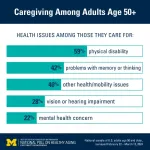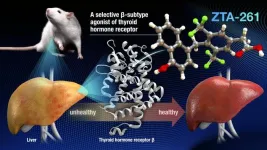(Press-News.org) One popular strategy to motivate people to get vaccinated is the nudge—a message designed to take advantage of human tendencies to conform to social norms, seek to protect loved ones or community, and to prefer treatments with high efficacy rates. Jiseon Chang and colleagues sought to assess the efficacy of such nudges in real world contexts during the COVID-19 pandemic. The authors paid for ads to appear on Facebook between October 2021 and January 2022, reaching almost 15 million users in Brazil, Russia, South Africa, Taiwan, Turkey, and the United States. All ads included stock images of happy people spending time together. Placebo ads simply urged users to click a link to sign up for the vaccine. Nudge ads included additional information. One nudge ad noted that “87 percent of people are already or plan to be vaccinated.” This ad did not receive more clicks than the placebo in most countries and received significantly fewer clicks than the placebo in Taiwan—a surprising result, as nudges suggesting that vaccination is the norm perform well in lab settings and surveys. Another nudge urged users to “protect lives in your family”—a message that outperformed the placebo in Taiwan and Turkey but not elsewhere—or to “protect lives in your community” or “protect your life” both of which decreased clicks in the United States. Broadly, most nudges seemed to have no effect in most countries—and were even liable to backfire in certain contexts. According to the authors, when crafting pro-vaccine messages, the best strategy may be to build on country-specific norms, rather than appealing to a presumed universal human nature.
END
Nudges fail to motivate vaccination
2024-08-06
ELSE PRESS RELEASES FROM THIS DATE:
Caregiving: Poll reveals who’s providing care and who they’re caring for
2024-08-06
More than 1 in 4 people age 50 and older helps take care of at least one family member or friend who has a health problem or disability, a new poll finds.
And among those caregivers, the new results from the University of Michigan National Poll on Healthy Aging reveal a lot about who they are and who they’re caring for.
In all, 30% of all people in their 50s and early 60s provide care to at least one person with a health issue or disability, compared with 23% of people over 65. And 1 in 10 caregivers in their 50s and early 60s are juggling taking care of three or more people.
In ...
To predict tax revenue, look at corporate earnings
2024-08-06
To Predict Tax Revenue, Look at Corporate Earnings
States can make more accurate budget forecasts and avoid midyear cuts if they include growth in corporate earnings
AUSTIN, Texas -- In the complex task of building a state budget, much rides on the accuracy of its fiscal crystal ball: its forecast of how much tax revenue will come in to fund services during the year ahead. Forecasting errors have increased since 2001 due to revenue volatility, such as wider swings in personal income and consumer spending.
New research from Texas ...
New visual technique could advance early detection of neurodegenerative diseases
2024-08-06
MINNEAPOLIS / ST. PAUL (08/06/2024) — Researchers at the University of Minnesota, have developed a new visual diagnostic technique that can be used to advance early detection for neurodegenerative diseases like Parkinson's disease and similar diseases that affect animals, including Chronic Wasting Disease in deer.
The research is published in npj Biosensing, a peer-reviewed scientific journal published by Nature.
Named Cap-QuIC (Capillary-enhanced Quaking-Induced Conversion), researchers will now be able to distinguish infected samples with the naked eye, which makes testing ...
ALS diagnosis and survival linked to metals in blood, urine
2024-08-06
People with higher levels of metals found in their blood and urine may be more likely to be diagnosed with — and die from — amyotrophic lateral sclerosis, or ALS, a University of Michigan-led study suggests.
Researchers have known that ALS, a rare but fatal neurodegenerative condition, is influenced by genetic and environmental factors, including exposure to pesticides and metals.
This latest study examined the levels of metals in the blood and urine of people with and without ALS, finding that exposure to individual and mixtures of metals is associated with a greater risk for ALS and shorter survival.
The ...
Anxiety reframed can make business pitches more effective
2024-08-06
PULLMAN, Wash. – It may be possible to turn anxiety into a superpower in some scenarios, recent research with entrepreneurs indicates.
A Washington State University-led study found that if entrepreneurs preparing to make a funding pitch connected their pitch anxiety to their passion for their venture, judges ranked their performance higher. Perhaps even more importantly, the judges were also more likely to recommend them for funding.
This emotion reframing involved the entrepreneurs recognizing that they were feeling anxious partly because the project means so much to them. Entrepreneurs who tried other strategies ...
Study finds refined corn flour with added corn bran can lower cholesterol
2024-08-06
The findings of the randomized crossover clinical trial, available online now and slated to appear in an upcoming issue of the Journal of Nutrition, reveal simply swapping in foods made from refined corn flour + corn bran can lower LDL cholesterol concentrations by anywhere from 5% - 13.3% in just four weeks.
The trial compared the impact of whole-grain corn meal, refined corn meal, and a blend (refined corn meal plus corn bran) and found that 70% of the participants saw significant reductions in LDL cholesterol concentrations when consuming the blend. For the other corn flours, participants did not see a decrease in their LDL or total cholesterol ...
Carvings at ancient monument may be world’s oldest calendar
2024-08-06
Markings on a stone pillar at a 12,000 year-old archaeological site in Turkey likely represent the world’s oldest solar calendar, created as a memorial to a devastating comet strike, experts suggest.
The markings at Göbekli Tepe in southern Turkey – an ancient complex of temple-like enclosures adorned with intricately carved symbols – could record an astronomical event that triggered a key shift in human civilisation, researchers say.
The research suggests ancient people were able to record their observations of the sun, moon and constellations in ...
Sport or snack? How our brain decides
2024-08-06
In brief:
The chemical messenger orexin and the orexin neurons in the brain mediate the decision between exercise and snacking. Researchers at ETH Zurich made this discovery in mice. The results are likely to be transferable to humans.
In the experiment, mice with a blocked orexin system opted more frequently for the milkshake offered them and less for exercise.
These results could help in researching and developing new strategies to promote physical activity in people.
Should I go and exercise, or would I rather go to the café ...
A new way of thinking about the economy could help protect the Amazon, and help its people thrive
2024-08-06
To protect the Amazon and support the wellbeing of its people, its economy needs to shift from environmentally harmful production to a model built around the diversity of indigenous and rural communities, and standing forests.
A group of conservationists from Bolivia, Brazil, Peru, Ecuador, the US and the UK say that current conservation and development efforts will never sustain or scale without systemic changes in how economies are designed.
Despite extensive destruction of the Amazon in the name of economic development, Amazonian communities have seen little improvement in income, life expectancy, and education. The researchers have ...
Controlling lipid levels with less side effects possible with new drug
2024-08-06
Scientists at Nagoya University in Japan have made a significant breakthrough in treating lipid disorders. They have developed a new compound, ZTA-261, which selectively binds to the thyroid hormone receptor beta (THRβ). THRβ plays an important role in the regulation of lipid metabolism, which affects lipid levels in the blood. Mice administered the drug showed decreased lipid levels in the liver and blood, with fewer side effects in the liver, heart, and bones compared to existing compounds. These findings, published in Communications Medicine, suggest that ZTA-261 ...




